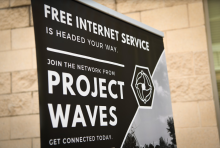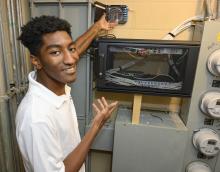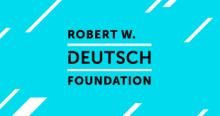Making Waves in Baltimore with Community-Driven Connectivity
*This is the first installment of an occasional profile on Local Community Broadband Champions where we focus not so much on the technology, construction, and financing of a community network build, but on the personalities of the people who make it happen.
When Devin Weaver isn’t vibing at the Otto Bar or checking out the underground music scene at Metro Gallery, or even playing his bass guitar at home, the 28-year-old network engineer enjoys spending time amid the web of wires in storage closets inside low- and mixed-income apartment buildings dotting the city’s landscape.
It’s where his network design handiwork all comes together, snaking through the buildings to the routers installed in individual apartment dwellings, enabling residents to get gig speed Internet service.
That’s on par with what the regional monopoly provider Comcast offers city residents who can afford it. But in the buildings that Devin has made his technical playground, hundreds of financially-strapped households who subscribe to the fledgling community network he oversees get it for free – thanks to the philanthropy of dozens of organizations including the Internet Society Foundation, the France-Merrick Foundation, and the Digital Harbor Foundation.

Born and raised in Baltimore, Devin works for Project Waves, a non-profit organization founded in 2018 by an old high school classmate of his, Adam Bouhmad, to bring broadband to mostly low-income households in Baltimore City.
A Small, Rising Wave of Connectivity



